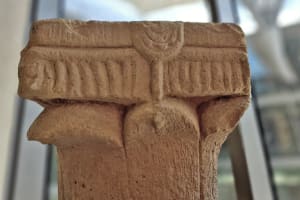Israeli president continues to seek compromise on judicial reform, says possible ‘within days’
Herzog gives example of 'resolution through dialogue' from Book of Joshua

Israeli President Isaac Herzog said on Sunday that he believes the Israeli parliament could come to a compromise agreement on the proposed judicial reforms within a “matter of days.”
Speaking at his official residence during a meeting of the 929 Project Hebrew Bible study group, Herzog spoke of his great concern over the rifts in Israeli society. The president opened his remarks by talking about a Bible chapter he said is “relatively unknown” but, unlike many other Bible passages that speak of division, has a “happy end.”
This chapter “doesn’t in end in war, but in listening,” Herzog said. The chapter contains “the instruction of conversation, the instruction of unity, the possibility to choose a different way.”
Herzog was referring to the story in Joshua chapter 22, about the tribes of Reuben and Gad, and the half tribe of Manasseh. returning to their territories east of the Jordan River after the conquest of the land of Israel and, apparently, also the death of Joshua.
Beyond the Jordan, the tribes built a huge altar to the LORD, an action that raised the ire of the tribes to the west, and they prepared for war.
“The first civil war is at the door,” Herzog said. The president described how the western tribes sent a delegation to these tribes, asking why they had done this against the LORD. The eastern tribes responded by saying they built an altar, not for separate worship, but as a testimony to their unity for future generations, Herzog explained.
“Chapter 22 of Joshua doesn’t end with civil war, it doesn’t end with the division of the nation. … It does end with listening,” he said. “If we had only paid more attention to this chapter, and taken its warnings seriously, the Jewish history would have been different from end to end.”
“Between the 75th year of Israel’s independence and the 80th year, the year of heroism, we are facing a fateful hour of testing. I see before my eyes the divisions and rifts within us, which are becoming more and more deep and painful at this time, and I cannot help but reflect seriously on the fact that twice in history, a Jewish state arose in the Land of Israel and twice it collapsed before reaching its 80th year,” Herzog said.
“In the last week, I have invested everything in meetings and contacts with all sides of the map, including leaders from the coalition and the opposition, in connection with the controversy before us, with the aim of doing everything [possible] and reaching negotiations and agreements,” he said. “After all the conversations I had, I state unequivocally – we can reach an agreement within a short period of time, even in a matter of days. Not years, not even months.”
The president also pleaded for unity: “We must not give up on Israeli unity. We must not give up the Jewish and democratic state.”
“I believe that we don’t need any more dramatic chapters in our history, but especially more chapters of peace, dialogue and listening,” Herzog said.
Ironically, just before the president’s call for unity, Israeli Finance Minister Bezalel Smotrich and Israel’s opposition leader ,Yair Lapid, engaged in a spat, with Smotrich accusing Lapid of wanting civil war.
“Lapid isn’t interested in broad national agreement. He isn’t interested in the good of the State of Israel. He isn’t interested in preventing a rift in the nation. Yair Lapid wants a civil war,” he stated.
Lapid responded that he was the one seeking dialogue.
“Those who want to prevent civil war do not promote hasty and violent legislation that tears the people apart. I was the first to suggest going to the president for talks,” he said.
The first two of several judicial reforms are scheduled for their first reading in the Knesset later today. Protestors could already be seen making their way to the Knesset in Jerusalem early this morning.

The All Israel News Staff is a team of journalists in Israel.














